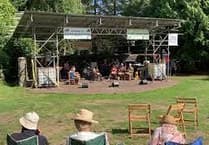In the Forest of Dean, friendly societies ranged in complexity from local branches or lodges of the Ancient Order of Foresters (AOF) and the Oddfellows, through to very simple single benefit or saving clubs.
One trigger for the development of friendly societies was the stigmatising of people who fell into poverty and faced the brutal conditions of the workhouse.
The first friendly society with enrolled rules in the Forest met at The Angel Inn, Ruardean in 1760; this was followed by one at The Ship, Newnham in 1765 and the Beneficial Club at The Jovial Collier, Coleford in 1766.
Littledean was a prominent early focus for the movement, by 1857 hosting the Littledean Mutual Benefit Society, Littledean Female Benefit Society, and the Littledean Oddfellows Society. The Bollow Benefit Society was established in 1833 and met at the Bollow Inn.
Friendly societies retained a ‘club’ atmosphere, and were in most instances hosted by public houses, celebrating their achievements with an annual dinner, speeches, and a procession.
A major challenge was the care of cash handled by the societies. Cash boxes held by societies had three or four locks, a key for each officer of the society, and could only be opened when all key holders were present. Joseph James of the Newnham on Severn Court Severn Side Lodge of the AOF was brought before the magistrates at the Victoria Inn, Newnham in November 1878. He was charged with embezzling £1 7s 6d from the society and despite strongly refuting the charges he was fined £5 or a month in prison and required to reimburse missing funds.

The Robin Hood Society, formed in the mid-1830s and based in Bilson had some 300 members and met at the White Hart. The Newerne Blue Benefit Society, formed in the early 1840s, met at the Swan Inn and was attended by John James the Iron and Coal Master as well as iron and tinplate workers. This was typical of many societies as employers were happy to support self-help organisations as long as they didn’t become trade unions.
Frank Brain, the owner of Trafalgar Colliery was Secretary of the Good Samaritan Friendly Society that met at the Congregational School Room in Drybrook.
The first Oddfellows’ lodges in the Forest were formed at Littledean, Ruardean and Mitcheldean, in the early 1840s. The Mitcheldean Good Samaritan Lodge held an anniversary festival on 28 August 1846 at the George Inn and were joined by the Mitcheldean Brass Band and members of the Littledean and Ruardean Lodges.
The Parkend Court was established in 1863 at the New Inn, Parkend. The Lydney ‘Star of the Forest’ Court was established in 1865 and their ‘clubhouse’ was the Feathers Hotel. The Star of the Forest was one of the largest friendly societies in the Forest.
Friendly societies appropriated their symbols of office from the old masonic and craft bodies, including aprons, collars and chains, sashes and gauntlet cuffs. Officers were given opaque titles and meetings included the ritualised initiation of new members.
Women created their own societies as early as the eighteenth century. The Coleford Female Benefit Society began in 1812, meeting at the White Hart Inn. The Yorkley Female Benefit Society met at the Nags Head in 1853. The Lydney Female Benefit Society was supported by Mrs Charles Bathurst and thrived with over 400 members. By 1872 it had a fund containing £700. These societies sometimes offered benefits for women such as ‘lying-in’ payments when they were confined because of childbirth.
The All Saints Female Benefits Society flourished after the Viney Hill church was built. It had 108 members in 1886. It was more conservative, meeting in the Viney Hill school rooms, not a public house and its annual meeting was marked by an afternoon tea, without the usual band and dancing. The Nonconformist and Anglican churches were strongly supportive of the self-reliance ethic.
Alice Lloyd, who ran the Globe Inn, Newland with James her husband, and Dinah Morgan, a ‘laundress’ of Coleford, were stewards of the Coleford Female Benefit Society. in 1853 Lloyd and Morgan were called before the magistrates at Coleford charged with excluding Elizabeth Halford from the society on the basis that she had gone shopping while receiving sick pay from the society. The magistrates felt that the case was outside their jurisdiction.

In 1892, the AOF took what was regarded as revolutionary step, to extend benefits to women.
In Cinderford the East Dean Economic Benefit Society, formed at the Baptist Chapel in 1854 by Timothy Mountjoy, a preacher, temperance leader and local miners’ union organiser, provided welfare insurance and promoted temperance. Mountjoy, as with other temperance organisers, eschewed public houses but he also decided his society would have no parade, music, and annual dinner days preferring to meet in a schoolhouse.
Many of the early trade unions were ‘friendly societies’ such as the Friendly Society of Operative House Carpenters and Joiners of Great Britain established in 1827. Craft unions such as those in printing developed sophisticated mechanisms to support members through illness, unemployment and retirement. These included ‘tramping relief’ when out- of-work members could move from place to place in search of work.
The friendly societies were fiercely opposed to the Liberal reforms that introduced the National Insurance Act and pension provision in 1911. This was partly self-interest, but also ideological, as many believed state welfare provision undermined their fundamental principle of self-help.
The spirit of mutual assurance and the ideas behind friendly societies persisted in the Forest of Dean with death clubs and smoking evenings. The Forest of Dean retains a community resilience and mutual aid that has its origins in these nineteenth century traditions.
Read the full story of the Forest’s friendly societies and other local stories in The New Regard: https://forestofdeanhistory.org.uk




